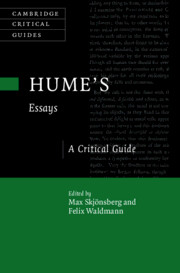Book contents
- Hume’s Essays
- Cambridge Critical Guides
- Hume’s Essays
- Copyright page
- Dedication
- Contents
- Figures
- Contributors
- Acknowledgements
- Abbreviations
- Introduction
- Part I Reception
- Chapter 1 The Reception of Hume’s Essays in Eighteenth-Century Britain
- Chapter 2 The Reception of Hume’s Essays in Eighteenth-Century Germany
- Chapter 3 ‘Aussi hardi … qu’aucun philosophe en France’:
- Part II Philosophy
- Part III Politics
- Part IV Political Economy
- Bibliography
- Index
- Cambridge Critical Guides
Chapter 3 - ‘Aussi hardi … qu’aucun philosophe en France’:
The Eighteenth-Century French Reception of Hume’s Essays*
from Part I - Reception
Published online by Cambridge University Press: 02 January 2025
- Hume’s Essays
- Cambridge Critical Guides
- Hume’s Essays
- Copyright page
- Dedication
- Contents
- Figures
- Contributors
- Acknowledgements
- Abbreviations
- Introduction
- Part I Reception
- Chapter 1 The Reception of Hume’s Essays in Eighteenth-Century Britain
- Chapter 2 The Reception of Hume’s Essays in Eighteenth-Century Germany
- Chapter 3 ‘Aussi hardi … qu’aucun philosophe en France’:
- Part II Philosophy
- Part III Politics
- Part IV Political Economy
- Bibliography
- Index
- Cambridge Critical Guides
Summary
The role of France in David Hume’s intellectual biography is difficult to overestimate. He visited that country three times, wrote the Treatise in La Flèche, and reached the peak of his success during the years he spent in Paris (1763–66), where he was welcomed as a highly valuable member of the Republic of Letters. He cared greatly about the circulation of his writings in France, and actually succeeded in establishing his reputation across the Channel. The History of England made him an outstanding historian, the Natural History of Religion an authoritative esprit fort, but it was the Essays that confirmed him as a subtle political thinker and, what he cared about most, as a profound philosopher in the eyes of his French readers. Before and besides being translated in the form of collections, many of Hume’s essays were translated, summarised, commented on, reviewed, and discussed individually, giving rise to a complex and divergent reception. The present chapter provides an overview of this reception, based on first-hand research on eighteenth-century French translations, reviews, commentaries and criticisms of the Essays.
- Type
- Chapter
- Information
- Hume's EssaysA Critical Guide, pp. 52 - 70Publisher: Cambridge University PressPrint publication year: 2025

